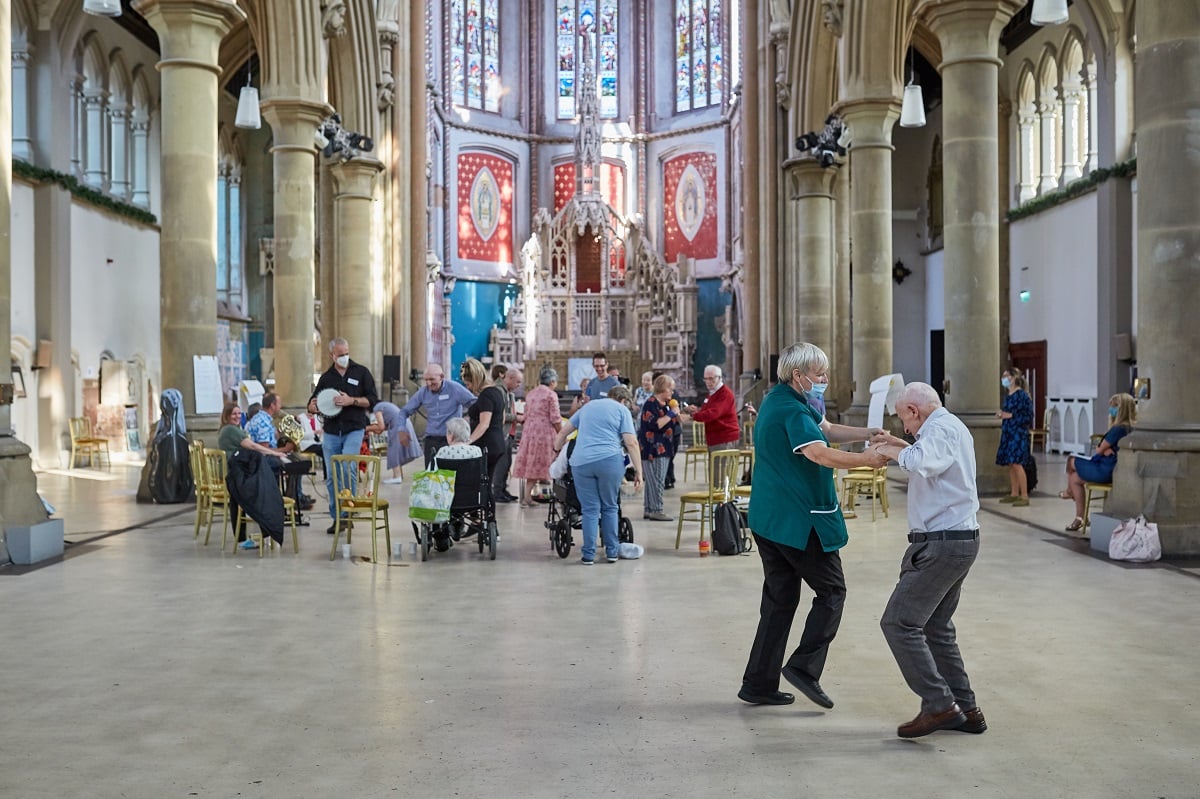
Manchester Camerata provides music therapy for people with dementia
Music has ‘critical role’ to play in reimaging healthcare
Recommendations in a new study include a Power of Music Commissioner, a cross-governmental taskforce and music education modules for healthcare workers.
Music is a “miracle medicine” and should be more widely integrated into healthcare, organisations behind a new study say.
The Power of Music study, conducted by UK Music and Music for Dementia and supported by the Utley Foundation, calls for “a fundamental repositioning of music in our collective consciousness as a public health tool and community asset” to cut healthcare costs and reduce reliance on medications.
READ MORE:
It sets forth four key recommendations to make music in healthcare more accessible: new public-private investment partnerships, a training module for frontline workers, a major public awareness campaign, and the creation of Britain’s first Power of Music Commissioner.
The commissioner would be tasked with establishing a cross-government taskforce and an independent Life with Music Consortium to facilitate cross-sector coordination and connect existing priorities a with new policies.
They would also ensuring equal representation across the devolved nations and work with relevant bodies to integrate music into policy and delivery.
“The pandemic has shown us how we urgently need to reimagine health and social care in the U.K.,” Grace Meadows, campaign director of Music for Dementia, said.
“Music has a critical role to play in this and while we’re committed to making this happen, we can’t do this alone. We need leadership, public engagement and funding at the very least, including the appointment of a Power of Music Commissioner who will turn our recommendations into action.”
Healthcare impact
The report cited studies showing that music therapy reduces dementia patients’ need for anti-psychotic medication by 67%.
It also helps relieve anxiety and depression, reduces stress for patients undergoing surgery, aids self-regulation for those on the autism spectrum, and is an effective tool in treating conditions ranging from cerebral palsy, Parkinson’s, and cardiovascular disease.
One study found that playing a musical instrument in older adulthood cut the risk of developing dementia by a third, UK Music CEO Jamie Njoku-Goodwin said.
“Every day more and more evidence emerges about the extraordinary health benefits of music and its potency as a non-pharmacological intervention,” he said.
“When used correctly, music can be a miracle medicine – and while there are thousands of people across the country who have seen this first-hand, there are millions more who have yet to enjoy its benefits.”
Public awareness
The report comes at a crucial time for Britain’s health and social care services, which remain pressured by the pandemic.
“The timing of it is really good, coming out of the pandemic,” said Alison Teader, Director of Programming for NAPA Arts in Care Homes. “I think people really understand the need for meaningful engagement and the benefits of creativity because they’ve experienced them first-hand.”
It echoes the findings of a study conducted last year by NAPA, the U.K.’s leading activity and engagement charity, which sought to identify a way for all English care homes to offer creative and cultural opportunities.
In that, care providers expressed a need to shift public perceptions of the necessity of regular creative engagement and provide specialist training – one of the Power of Music report’s recommendations.
“Having that, plus this idea for the Power for Music Commissioner demonstrates a real commitment to the interest in embedding arts into health and care and sends out a really powerful message with this three-year public campaign,” Teader said.
“I think it’s needed, it’s wanted, and it could be really effective.”
Meadows added: “One of our biggest challenges is that many people still don’t fully appreciate the power of music, but we could begin to change that within a year.”
Next steps
It is crucial the new commissioner coordinates with care home inspectors to make music part of their everyday operations.
Bodies such as the Care Quality Commission, which inspects and legislates care homes, assess how well they provide “meaningful engagement” to their residents.
Care home staff and residents in NAPA’s study cited engaging with music, including singing and listening, as the most effective creative activity but the research also emphasised the importance of offering a diverse range of arts activities.
Teader said music “definitely comes across as very highly regarded” but that Arts in Care Homes is eager to promote all kinds of creative engagement.
Measures outlined in the Power of Music report are “really just the first step”.
“If we get it right using music, interest and development in the other arts will follow.”
Join the Discussion
You must be logged in to post a comment.